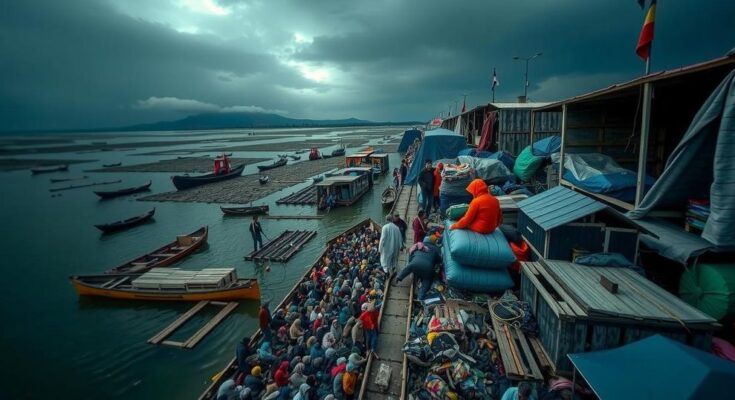The United Nations has reported that climate change is severely worsening global displacement conditions, with millions being uprooted from their homes due to extreme weather and conflict. Current challenges faced by displaced individuals demand urgent funding and adaptation strategies, particularly in regions severely affected by climate hazards.
The United Nations has reported a dire worsening of the global refugee situation, primarily driven by climate change, which has been displacing record numbers of individuals worldwide. During ongoing climate negotiations in Baku, the UN refugee agency emphasized that extreme weather events and rising temperatures are not only increasing displacement figures but also intensifying the adverse living conditions of those affected. Moreover, the report highlights that regions such as Sudan, Somalia, and Myanmar are at the mercy of climate shocks that exacerbate existing conflicts, thereby aggravating these already critical scenarios. UNHCR chief Filippo Grandi underscored that displaced populations are often situated in high-risk areas, stating that “People forced to flee their homes are on the front lines of this crisis.” Notably, approximately 75 percent of displaced individuals reside in countries that experience significant climate-related threats. This precarious state of affairs is exacerbated by the alarming forecast that the number of nations susceptible to extreme climate hazards will escalate drastically by 2040. Increasingly, the numbers are reflective of a greater trend; ONHCR recorded 120 million forcibly displaced individuals due to violence, war, or persecution, with indications suggesting that the displacement due to climate action has reached 220 million in the past decade alone. This rate equates to roughly 60,000 displacements each day, illustrating a troubling trajectory that necessitates urgent intervention and investment in adaptation measures. Furthermore, Andrew Harper, UNHCR’s special advisor on climate action, lamented the inadequate funding available to support displaced communities, highlighting that many refugee settlements are founded in lower-income countries that lack the necessary infrastructure to weather climate challenges. He asserted that without significant financial investment in climate resilience, the cycle of displacement will persist. The UN urges participants of COP29 in Baku to prioritize climate financing for the most vulnerable refugee populations, stressing the stark contrast in assistance between fragile and stable states. Harper compellingly states, “If we don’t invest in peace, if we don’t invest in climate adaptation in these areas, then people will move,” demonstrating the urgent need for stakeholders to act decisively. By projecting a future where refugee camps may double their occurrences of dangerous heat by 2050, the implications for these communities elucidate a critical demand for action to prevent dire humanitarian consequences.
The article addresses the intersection of the climate crisis and global displacement, highlighting how worsening climate conditions are exacerbating the situation for millions of displaced individuals. As the UN refugee agency expounds upon the complications arising from extreme weather and conflicts, the report examines the rising number of people affected and the urgent need for increased funding and development of resilient infrastructures within vulnerable countries. This context sets the stage for understanding the role of climate change in perpetuating global crises, as well as the contemporary responsibility of international decision-makers in addressing these challenges during climate negotiations.
In conclusion, the escalating displacement crisis fueled by climate change necessitates urgent attention and investment in adaptive strategies for vulnerable populations. The UNHCR’s findings underscore the increasing intersection of extreme weather events and conflict, which together propel significant numbers of individuals into dire circumstances. Without a concerted effort to bolster funding for climate resilience and support displaced communities, the humanitarian situation will likely deteriorate. As Andrew Harper asserted, investments in peace and climate adaptation are critical to mitigate further displacements.
Original Source: www.latintimes.com




